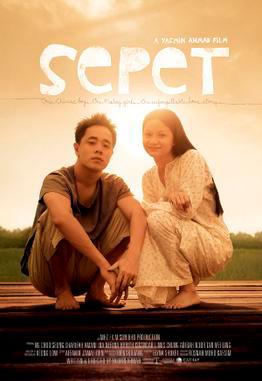KUALA LUMPUR: In the 2005 hit movie “Sepet”, the lead character Orked, played by Sharifah Amani Syed Zainal Rashid Al-Yahya, utters this line: “Who cares if someone loves another person of a different race? It’s only a problem if they hate each other.”
Almost every scene in “Sepet”, which features a Malay girl and Chinese boy falling in love with each other, touches the hearts of Wong Pei Wen, 32, and her husband S. Vicneshvaran, 34, each time they watch the film together.
“As a Chinese-Indian couple, we could identify with the film’s characters as its storyline touches on their struggles of being an interracial couple,” said Dungun-born Wong, an accounts executive.
Wong and Vicneshvaran, who tied the knot in 2016 and have a two-year-old daughter, are an excellent example of how an interracial couple can build a happy marriage by embracing each other’s cultural and religious diversities.
In Malaysia, there has been an upward trend in inter-ethnic marriages in recent years. According to the Department of Statistics Malaysia’s Marriage and Divorce Statistics report issued in November 2019, nine percent of total marriages in 2018 (18,509 out of 206,253 marriages) involved interracial marriages.
This was an increase from the eight percent (16,238 out of 203,741 marriages) interracial marriages recorded in 2017.
Out of the 18,509 inter-ethnic marriages in 2018, 48.3% comprised Muslim and 51.7% non-Muslim marriages.
MORE RECEPTIVE NOW
Commenting on the rising trend in interracial marriages, principal fellow at Universiti Kebangsaan Malaysia’s Institute of Ethnic Studies Prof Datuk Dr Teo Kok Seong said Malaysians have now become more receptive towards marrying outside of their own race.
“In the past, many people were opposed to interracial marriages, particularly if it involved non-Muslims marrying Muslims as it would require them to convert to Islam. But these days people are more open to such marriages,” he told Bernama.
He said the openness to mixed marriages shows that Malaysians are willing to embrace cultural diversity which, indirectly, will enable them to appreciate the festivals and customs of other races.
“This will foster unity and love for the nation,” he said, stressing that the spirit of unity is something that has to be inculcated into children at a young age.
This is also in line with the aspirations of Malaysia’s national philosophy Rukun Negara, the objective of which is to forge national unity. This year also marks the 50th anniversary of Rukun Negara and its golden jubilee celebrations are being held from July 9 to Sept 16 in conjunction with National Month 2020.
Kuala Lumpur Thean Hou Temple Marriage Registration Department officer Chow Soo Sin said interracial marriages can help to strengthen relationships among people of different races and faiths, and forge unity.
“Such marriages promote racial harmony and allow us to enjoy our diversity better,“ she added.
FAMILY OPPOSITION
Wong, meanwhile, said she finds falling in love and marrying someone who is of a different race and practices a different culture a very rewarding experience.
“We help to broaden each other’s perspectives and even find a connection in our differences. Ideally, love should have no bounds.
“For most parts, in all honesty, most Malaysians don’t have major problems with interracial relationships which are highly common in a multiracial country,” she said.
Wong said while inter-ethnic relationships are generally accepted in this country, there are still occasions when people would stare at her and her husband, probably out of sheer curiosity or with a hint of disapproval.
“But we just accept it with an open heart and try to overcome every struggle and obstacle that exists in our marriage,” she added.
Wong said she first met Vicneshvaran, who works as a finance executive, in 2007 when they were studying at Universiti Tenaga Nasional.
When they decided to get married four years ago, her family, especially her mother, was among the first to oppose.
“Having lived in Dungun (in Terengganu), my family hardly mingled with Indians so they had this idea that all Indian men drink and beat their wives.
“At one point, they thought Vic (Vicneshvaran) had put a charm on me and made me go to a temple to get rid of it. I was given a potion to drink and Vic told me to drink it daily as he wanted to see if it worked ... obviously, it didn’t work and I ended up marrying him!” she said, laughing.
Wong’s parents boycotted their wedding but they relented and visited her and her husband after the birth of their daughter two years ago.
Wong said she and her husband respect each other’s traditions and even have their own Chinese New Year reunion dinner, as well as celebrate the Mid-Autumn Festival and Winter Solstice festivals together.
“I remember my first Ponggal (Tamil harvest festival) with Vic ... I attempted to cook the traditional Indian sweetened rice but it came out like porridge instead,“ she said.
PROUD TO BE OF MIXED PARENTAGE
Meanwhile, Mohd Amin Ismail, 55, a draughtsman from Kajang, Selangor, who was born to a Malay father and Chinese mother, has had the best of both worlds, so to speak.
He said his parents raised him by preaching the values of acceptance and tolerance and giving him the freedom to choose.
In school, he was confused when his classmates teased him by calling him Ah Pek due to his fair skin and Chinese features.
“But I accepted it and learned to respect various cultures by having friends who belonged to other ethnic groups.
“Now I look like a Malay guy but I can speak fluent Cantonese and a little bit of Mandarin, so it is easier for me to communicate with my Chinese friends and it is a bonus for me too in my career,“ he said.
Mohd Amin added that the benefit of growing up in an interracial family was that it exposed him and his four siblings to the diverse cultures of their parents. — Bernama













